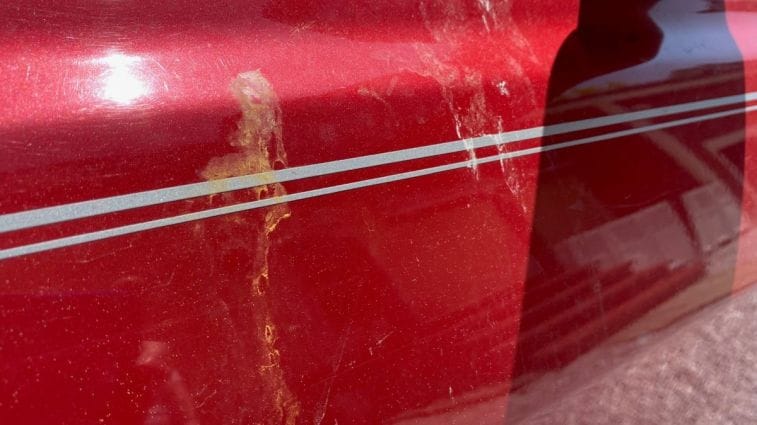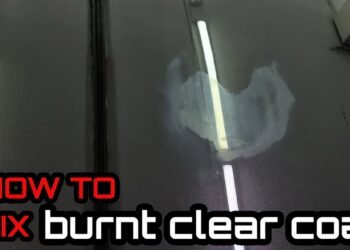Are you wondering if vinegar is safe to use on your car’s paint? Maybe you’ve heard that it can help remove stubborn water spots, but you’re worried about damaging your car’s finish.
You’re not alone—many car owners ask the same question. The truth is, vinegar’s acidic nature can harm your car’s paint if used improperly. But does that mean you should avoid it completely? You’ll discover when vinegar can be risky, how to use it safely if needed, and better alternatives to keep your car’s paint shining and protected.
Read on to learn how to care for your car’s finish without causing unwanted damage.

Credit: www.kbb.com
Vinegar’s Effect On Car Paint
Vinegar’s effect on car paint depends largely on its acidic nature and how it interacts with the paint layers. Vinegar contains acetic acid, which can cause damage if used improperly. This section explains the risks vinegar poses to car paint and how it affects different protective layers.
Acidic Nature And Paint Damage
Vinegar is acidic, with a pH around 2.5. This acidity can break down the paint’s surface. Over time, repeated exposure may weaken the paint layers. Fresh paint or thin paint coatings are more vulnerable to acid damage. Using vinegar undiluted increases the risk of harm to the car’s finish.
Impact On Clear Coat And Wax
The clear coat protects the paint beneath it from UV rays and scratches. Vinegar’s acid can dull this clear coat by stripping away its smooth, shiny finish. Vinegar also removes wax and sealants. Without wax, the paint loses a vital protective barrier, making it more likely to fade and corrode.
Risks Of Etching And Corrosion
Allowing vinegar to sit on car paint, especially in sunlight, can cause etching. Etching leaves permanent marks that look like small pits or dull spots. Prolonged acid exposure may lead to corrosion of metal parts beneath the paint. This damage is often irreversible and costly to repair.
When Vinegar Can Be Used
Vinegar can be a useful tool for car care when used carefully. Its acidic nature means it can damage paint if misused. Yet, in certain cases, diluted vinegar helps remove tough stains without harming the surface. Knowing when and how to use vinegar protects your car’s finish while solving specific problems.
Removing Hard Water Spots
Hard water spots form from minerals left on the paint after water dries. Vinegar’s acidity breaks down these mineral deposits effectively. Use a diluted vinegar solution to target these spots gently. This method works best on small areas with stubborn white or cloudy marks. Avoid rubbing too hard, which can scratch the paint.
Dilution Guidelines
Always dilute vinegar before applying it to car paint. A common ratio is one part white distilled vinegar to one part distilled water. Using distilled water prevents adding minerals that worsen spots. Never use undiluted vinegar, as it can strip wax and damage the clear coat. Spray the mixture lightly and avoid soaking the surface.
Precautionary Measures
Test the vinegar solution on a hidden spot first. Watch for any changes in color or texture. Apply vinegar only in shaded, cool conditions to avoid quick drying. Rinse the area thoroughly with clean water after a few minutes. Dry with a soft microfiber cloth to prevent water marks. Reapply wax or sealant after treatment to protect the paint.
Safe Application Tips
Applying vinegar to car paint requires care to avoid damage. Follow these safe application tips to protect your vehicle’s finish. Proper preparation and cautious use reduce risks linked to vinegar’s acidity. These guidelines help keep your car paint safe and shiny.
Proper Dilution Ratios
Always dilute vinegar before use. A common ratio is one part vinegar to one part water. Using distilled water helps avoid adding minerals. Undiluted vinegar is too strong and can harm paint. Proper dilution lessens acid strength and protects the clear coat.
Testing Before Use
Test vinegar solution on a small hidden spot first. This reveals any adverse reaction before full application. Wait a few minutes to check for discoloration or damage. If paint looks fine, continue carefully. If not, do not use vinegar on that area.
Avoiding Sunlight And Heat
Apply vinegar solution only in the shade or cool areas. Sunlight and heat speed up vinegar’s acid effects. This can cause etching or dullness on paint. Work on a cool surface and avoid hot weather. This precaution protects your car’s finish from harm.
Rinsing And Drying Procedures
Rinse the vinegar solution off immediately after application. Use plenty of clean water to remove all residue. Leaving vinegar on paint too long increases damage risk. After rinsing, dry the area with a soft microfiber towel. Drying prevents water spots and further damage.
Reapplying Wax Or Sealant
Vinegar strips wax and sealant layers off the paint. After cleaning, always reapply wax or sealant to protect the surface. This restores the protective barrier against elements and dirt. Regular waxing keeps your paint safe and looking new.
Better Solutions For Car Cleaning
Cleaning a car requires careful choice of products. Some household items like vinegar can harm your car’s paint. Safer and more effective options exist to keep your car shiny and protected. These solutions remove tough spots without damage.
Using the right products helps maintain your car’s finish longer. It keeps the paint smooth and clear. Let’s explore better ways to clean your car safely.
Specialized Water Spot Removers
Specialized water spot removers target mineral deposits without harming paint. They are designed to dissolve spots gently and quickly. These products often contain mild acids that break down hard water stains safely. Using them helps restore your car’s surface without dulling or etching.
Choose removers labeled safe for automotive paint. Follow the instructions carefully. Spot testing is recommended to avoid surprises.
Professional Detailing Products
Professional detailing products offer advanced cleaning power. These products clean, protect, and enhance your paint in one step. They often include polishers, waxes, and sealants. Such products help remove light scratches and water marks while adding a protective layer.
Using these products regularly keeps your car looking fresh. They provide a barrier against dirt, UV rays, and moisture.
Using Clay Bars For Stubborn Deposits
Clay bars remove embedded dirt and contaminants from your car’s surface. They glide smoothly over paint to lift stubborn particles. This process creates a smooth finish and prepares the paint for waxing or polishing.
Clay bars work well for tough water spots and grime that soap cannot remove. Use with a proper lubricant to avoid scratching. This method improves shine and paint clarity significantly.
Common Myths About Vinegar And Paint
Many people worry that vinegar might harm their car’s paint. Myths about vinegar’s effects spread fast. It is important to know the facts to keep your car safe. Vinegar is often labeled as harmful due to its acidity. The truth depends on how you use it and what you mix it with. Understanding these myths helps you clean your car better without damage.
Vinegar’s Corrosiveness Compared To Other Chemicals
Vinegar is acidic but much weaker than many cleaning chemicals. Strong acids like hydrochloric acid or battery acid cause severe damage quickly. Vinegar’s acidity is mild and usually only harmful if left on paint for a long time. It can remove wax and sealants, exposing paint to elements. Still, it is less corrosive than many industrial cleaners.
Mixing Vinegar With Soap And Water
Mixing vinegar with soap and water lowers its acidity. Soap helps break down dirt and grime gently. Water dilutes vinegar, reducing risk to paint and surfaces. This mix can clean spots like hard water stains safely. Avoid using pure vinegar alone on car paint. Always test on a small area before applying widely.
Effects On Chrome, Rubber, And Aluminum
Vinegar can damage chrome and aluminum by causing dullness or corrosion over time. Rubber parts may dry out or crack with frequent vinegar exposure. Use vinegar sparingly near these materials to avoid harm. Rinse thoroughly after use to remove any residue. Proper care keeps these parts looking good and lasting longer.

Credit: www.kbb.com

Credit: chemistry.stackexchange.com
Frequently Asked Questions
Can Vinegar Damage My Car’s Paint Finish?
Undiluted vinegar’s acid can harm the clear coat and dull the paint over time.
Is Diluted Vinegar Safe For Removing Water Spots?
Yes, a diluted vinegar-water mix can remove hard water spots if used carefully.
How Does Vinegar Affect Car Wax And Sealants?
Vinegar strips away wax and sealants, leaving paint unprotected from weather damage.
What Precautions Should I Take Using Vinegar On My Car?
Always dilute vinegar, test a small spot first, and avoid direct sunlight during use.
Are There Better Alternatives To Vinegar For Car Cleaning?
PH-neutral car wash soaps are safer and better for regular cleaning and paint protection.
Conclusion
Vinegar’s acidity can harm car paint if used incorrectly. Use diluted vinegar only for tough water spots and rinse quickly. Always test a small area first and avoid direct sunlight. Regular use damages wax and dulls the clear coat. Choose pH-neutral soaps or specialized products for safer cleaning.
Protect your car’s finish with proper care and waxing after any treatment. This keeps your paint looking fresh and lasting longer.

















